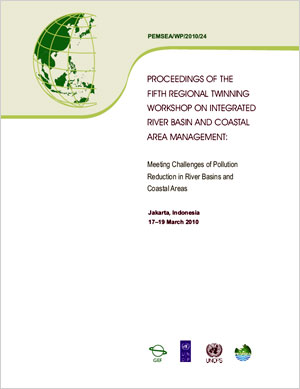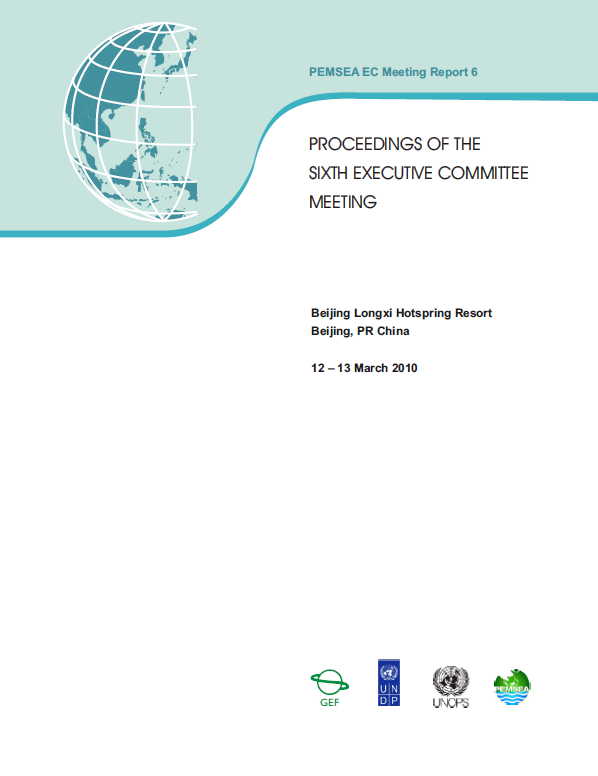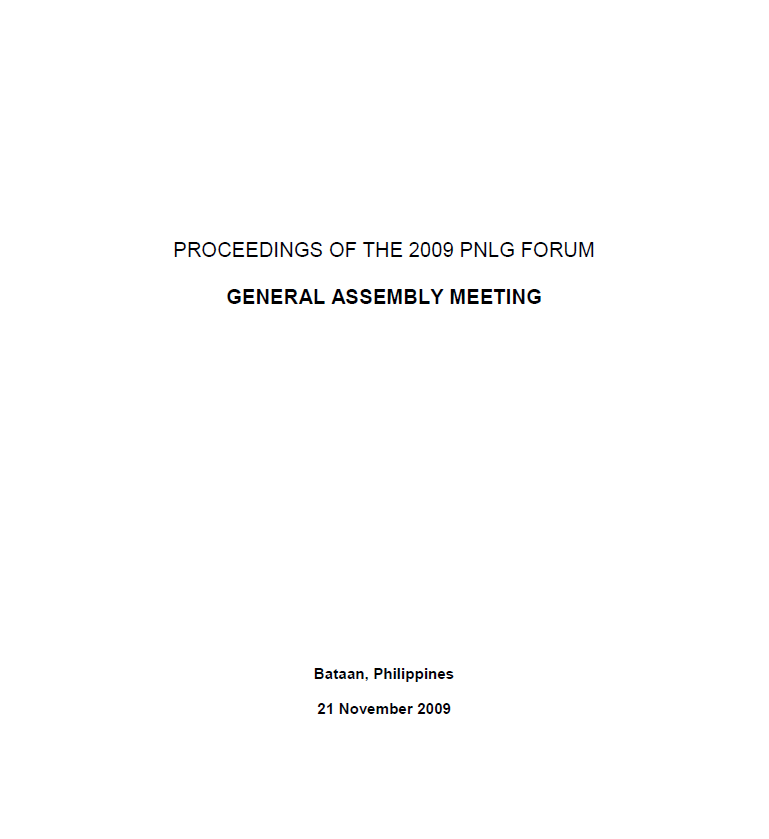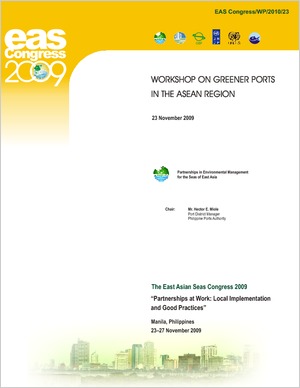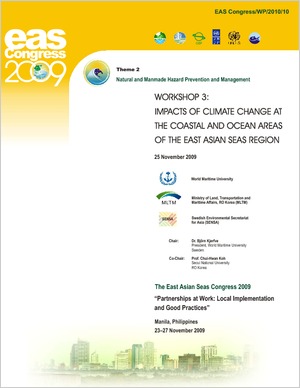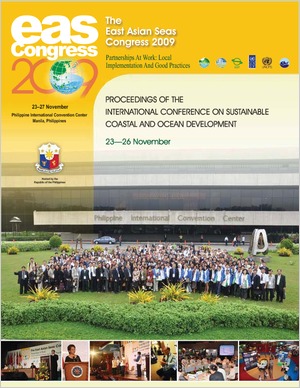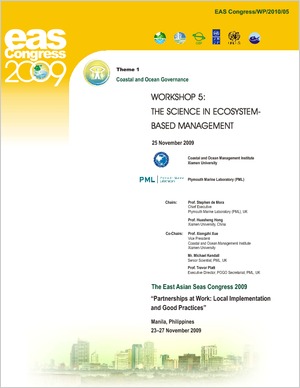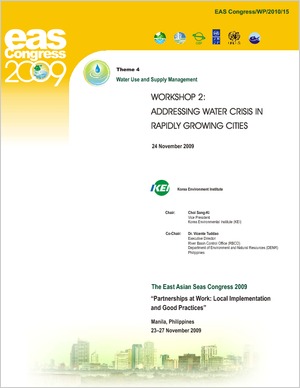
Breadcrumb
Proceedings of the Fifth Regional Twinning Workshop on Integrated River Basin and Coastal Area Management: Meeting Challenges of Pollution in River Basins and Coastal Areas
The 5th Regional Twinning Workshop on Integrated River Basin and Coastal Area Management (IRBCAM) with the theme "Meeting Challenges of Pollution Reduction in River Basins and Coastal Areas" was held at the Ibis Hotel, Jakarta, Indonesia, from 17 to 19 March 2010. The workshop was co-organized by Partnerships in Environmental Management for the Seas of East Asia (PEMSEA), PEMSEA Twinning Secretariat/Korea Maritime Institute (KMI), Ministry of Land, Transport and Maritime Affairs (MLTM) of Republic of Korea (RO Korea) and Ministry of Environment (MOE) of Indonesia. The participants were largely officials from the national and local government levels of Indonesia. The resource persons for the workshop were from various organizations and agencies from Indonesia, Philippines, RO Korea, the United States of America (USA), international and national nongovernmental organizations (NGOs), the private sector and donor agencies, including, the World Bank and Japan International Cooperation Agency (JICA). The workshop aimed to share experiences, good practices and lessons learned in planning, developing and implementing pollution reduction investments in Manila Bay (Philippines) and Jakarta Bay (Indonesia) within the context of IRBCAM.
Proceedings of the Sixth Executive Committee Meeting
The Sixth Executive Committee (EC) Meeting was held on 12-13 March 2010 in Beijing, People's Republic of China.The meeting provided an opportunity for discussion and interaction between the EC and the PEMSEA Resource Facility (PRF) on the required changes in operation and decisionmaking as part of the PRF's move from the UN system to a functional regional mechanism.
Document Number Document Title EC/10/DOC/01 Implementation of Previous Executive Committee Decisions EC/10/DOC/02 Post-East Asian Seas (EAS) Congress 2009 Report EC/10/DOC/07 Draft Provisional Agenda of the 3rd EAS Partnership Council Meeting
Proceedings of the 2009 PNLG Forum
GENERAL ASSEMBLY MEETING
Bataan, Philippines, 21 November 2009
A. INTRODUCTION
1. The 2009 PEMSEA Network of Local Governments (PNLG) Forum was held in conjunction with the convening of the 2009 East Asian Seas Congress. The EAS Congress was held on 23-27 November 2009 in Manila, Philippines and hosted by the Government of the Republic of the Philippines, through the Department of Natural Resources and Environment.
2. The PNLG General Assembly (GA) Meeting was held at Lou-is Resort and Restaurant, Balanga City, Bataan, Philippines on 21 November 2010. The GA meeting was hosted by the Provincial Government of Bataan and coorganized by PEMSEA, the PNLG Secretariat and the Bataan Coastal Care Foundation (BCCF), which comprises of private sector partners of the Bataan ICM program.
3. The GA Meeting tackled key issues related to the operationalization of the PNLG including the future role and thrusts of the network, fund management and election of officers. Highlights of the meeting included the induction of Thua Thien-Hue (Vietnam) as the newest member of the PNLG and the signing of the Letter of Cooperation between PEMSEA and the PNLG for the Sustainable Development and Management of Marine and Coastal Environment of the Seas of East Asia.
4. Twenty local governments from 10 countries across the region participated in the forum in addition to the representatives from the East Asian Seas Partnership Council, PEMSEA Resource Facility, the PNLG Secretariat, the private sector and local participants.
5. The participants to the PNLG participated in the EAS Congress and attended the Technical Workshop on Land and Sea-Use Zoning: Opportunities and Challenges on 23 November.
6. The meeting agenda and full list of participants is attached as Annex 1 and 2.
Proceedings of the Workshop on Greener Ports in the ASEAN Region
This publication summarizes the results of one of the workshops held during the East Asian Seas Congress 2009 on Greener Ports in the ASEAN Region. The seminar on Greener Ports examined various efforts and examples of green policies, regulatory enforcements, researches, proactive approaches including the drivers for investments in environmental initiatives. Examples and experiences within and outside the ASEAN region were reviewed with the end in view of identifying good practices and lessons learned to promote port sustainability and environmental stewardship in the region.
Proceedings of the Workshop on Addressing Transboundary Issues through Regional/Subregional Seas Cooperation: Initiatives in East Asia
This publication summarizes the results of one of the workshops held during the East Asian Seas Congress 2009 on Addressing Transboundary Issues through Regional/Subregional Seas Cooperation: Initiatives in East Asia. In the East Asia Seas (EAS) region, a number of regional and subregional transboundary projects on marine and coastal environmental management have been progressing or initiated recently, each with a goal of developing a subregional Strategic Action Plan (SAP), led by concerned countries, donor agencies, UN organizations, international NGOs, etc. In reviewing these initiatives and projects, the EAS Partnership Council of PEMSEA noted the need for collaboration between these initiatives and projects/programs for creating synergies and sharing knowledge in order to reduce possible duplication of effort, inefficient use of resources, and limited sharing of knowledge, experience, skills and tools. The need for an effective coordination mechanism for the region among the various projects/programmes and implementing agencies/organizations has also noted by the Council. With this realization, a workshop was convened during the EAS Congress 2009 to discuss on various transboundary environmental issues and their implementing mechanisms, good practices and areas of collaboration among the programmes and stakeholders involved. In the workshop, a number of regional, subregional and international organizations including UNDP and UNEP and initiatives including South China Sea, Yellow Sea, COBSEA, NOWPAP, PEMSEA, Conservation International Philippines, Sulu-Sulawesi Seas, Arafura-Timor Seas, Coral Triangle Initiative and Mangroves for the Future presented their works, discussed barriers and opportunities, and identified ways to move forward.
Proceedings of the Workshop on the Impacts of Climate Change at the Coastal and Ocean Areas of the East Asian Seas Region
This publication summarizes the results of one of the workshops held during the East Asian Seas Congress 2009 on the Impacts of Climate Change at the Coastal and Ocean Areas of the East Asian Seas Region. Climate changes are not new—cycles of tremendous climate changes have happened throughout Earth’s history; but in those times, the contributions from humans were nil or very insignificant. A grave concern is very apparent today; IPCC, in its 2007 report declared, beyond doubt, a warming of the global climate system and linking it to human activities. Humankind’s excesses have thus become manifold: pollution, overextractions, introductions, habitat destruction, and now climate change have tremendously altered ecosystems and the climate and are contributing to Earth’s destruction. It is against this backdrop that the Workshop on Impacts of Climate Change at the Coastal and Ocean Areas of the East Asian Seas Region was convened during the EAS Congress in Manila, Philippines in November 2009. This workshop was aimed at articulating climate change adaptation and resilience strategies within the context of sustainable development in coastal and marine environment. In particular, the workshop objectives are: To understand the types, level and severity of the adverse social and economic impacts of climate change; and To outline actions, initiatives or response measures within and outside the East Asian Seas region related to climate change adaptation and resilience strategies. The workshop was co-convened by the World Maritime University (WMU), the Ministry of Land, Transportation and Maritime Affairs of RO Korea (MLTM) and the Swedish Environmental Secretariat for Asia (SENSA). The impacts to the East Asian Seas region were discussed as they relate to sustainable development in Monsoon Asia, fisheries production, and shipping (with the opening of Northeast Passage and Arctic meltdown). The active discussion and sharing of experiences between natural and social scientists and policymakers made reaching a common understanding of global change issues as they affect vulnerability and adaptation in coastal regional settings. The workshop also became a venue which bridged the practitioners of global change with those of a local rural development focus. Also amply articulated were different perspectives coming from disaster risk, conservation and coastal management practitioners.
Proceedings of the International Conference on Sustainable Coastal and Ocean Development
This publication outlines the results of the International Conference on Sustainable Coastal and Ocean Development, held from November 23 to 26, 2009 in Manila, Philippines.
Proceedings of the Workshop on the Science in Ecosystem-based Management
The coastal and marine environment of East Asia is confronted with similar, if not more complex, management challenges as many other regions in the world. Ecosystem-based management (EBM) is widely advocated as a way of coping with multiple simultaneous pressures that are causing a decline in the state of the marine ecosystems. EBM requires a sound science supporting an adaptive management framework, undertakes integrated assessments to inform management decisions and to regulate multiple human pressures and coordinate and integrate national and international monitoring programs. Management efforts in the region should be, therefore, geared toward the adoption of an integrated, EBM approach and capitalize on the availability of scientific knowledge and technological advances from within and outside the region, including experiences in engaging wider participation of stakeholders in the scientific process. This report presents the highlights of the papers presented in the Workshop on the Science in Ecosystem-based Management, including the conclusions and recommendations drawn from the discussions. It covers, in particular, the key initiatives and experiences in integrating science into policy and management decisions. It also discusses innovative approaches to monitor ecosystem changes due to human interventions, identify effective strategies for knowledge transfer, packaging and communicating scientific information to support policy formulation. It also illustrates how various programs that adopt an ecosystem-based approach, which takes into account ecosystem knowledge and uncertainties, transboundary influences and balancing societal and environmental objectives, have contributed to promoting interdisciplinary research, which is essential for sustainable development of coastal seas.
Proceedings of the Workshop on Addressing Water Crisis in Rapidly Growing Cities
This publication summarizes the results of one of the workshops held during the East Asian Seas Congress 2009 on Addressing Water Crisis in Rapidly Growing Cities. As the most indispensable commodity of human life, water became the center theme of the world’s environment and development instruments. This is because there is no way of achieving sustainable development without securing water. As water became scarce, water security became a serious concern for most of the countries. The causes of water scarcity are plenty: population growth, pollution, failure in management such as disparities between water supply and demand, weak water use regulation and enforcement, as well as inefficient water use stimulated by inadequate water pricing, and depletion of groundwater resources, among others. With anticipated increase in climatic uncertainties, the problem of water scarcity is expected to exacerbate in years to come.
